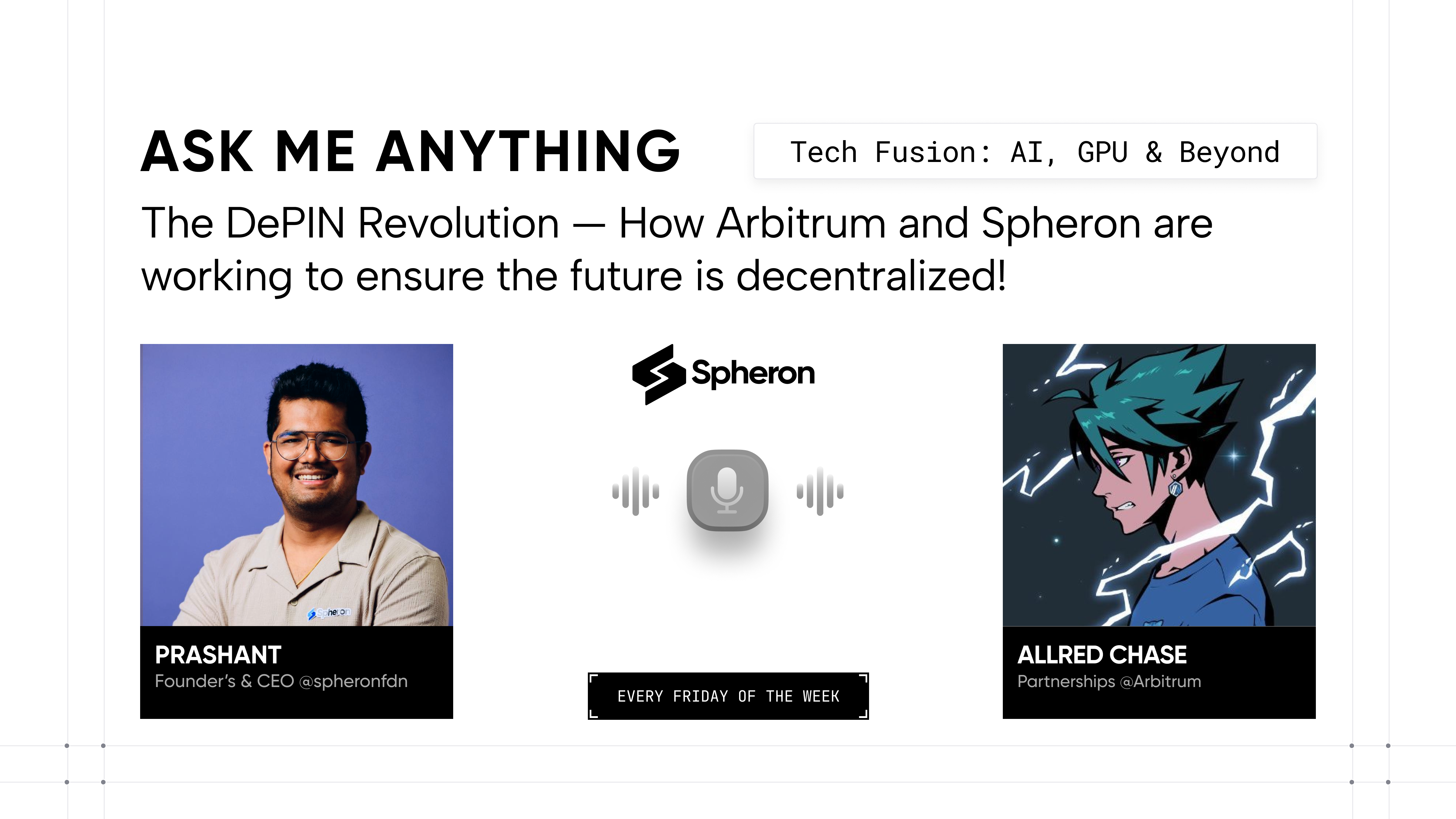Insights from the Tech Fusion Podcast: How Arbitrum & Spheron are working to ensure the future is decentralized
 Spheron Network
Spheron NetworkTable of contents
- Setting the Stage: Tech Fusion’s Vision
- Meet Chase: Building the Arbitrum Ecosystem
- The AI Hype: More Than Just Buzz?
- Decentralization and Its Impact on Society
- Understanding DePIN: Decentralized Physical Infrastructure Networks
- Crypto AI: A New Paradigm?
- Arbitrum’s Role in Advancing DePIN
- The Challenges and Opportunities of Scaling
- Stylus: The Future of Smart Contract Development
- The Role of Sequencers in Decentralization
- Final Thoughts: The Future of DePIN and Decentralization
- Conclusion

In today's web3 tech landscape, blockchain, artificial intelligence (AI), and decentralization converge to create new opportunities and challenges. The Tech Fusion podcast dives into these frontiers, bringing together experts to discuss the future of these technologies. In the first episode, Prashant from Spheron and Chase from Offchain Labs explore how decentralized infrastructure and AI reshape industries. Here’s a recap of their insightful conversation.
If you want to watch this episode, click below or head over to our YouTube channel.
Setting the Stage: Tech Fusion’s Vision
Prashant kicks off the episode by introducing the concept behind Tech Fusion. The platform aims to merge various components of blockchain technology into a cohesive system accessible to the masses. The name "Fusion" reflects Prashant's diverse background and the idea of blending different elements, much like fusion food, which combines distinct culinary traditions to create something new.
He also shares the mission of Spheron, the company he represents. Spheron focuses on building a distributed framework for the GPU Cloud. By connecting disconnected GPUs through a decentralized marketplace, Spheron provides robust computational resources essential for AI and other demanding applications.
Meet Chase: Building the Arbitrum Ecosystem
Allred Chase, who represents Offchain Labs as Partnership Manager, plays a key role in the Arbitrum ecosystem—a series of public chains designed to enhance scalability and efficiency in blockchain transactions. Arbitrum’s network continues to grow, with over 50 live projects. Chase focuses on infrastructure and explores how decentralized physical infrastructure networks (DePIN) intersect with AI.
The AI Hype: More Than Just Buzz?
During the discussion, Chase acknowledges the current "AI hype" but emphasizes that while many projects may not survive, the ones that do will profoundly change the world. He believes that democratizing access to computational resources, enabled by decentralized networks like Spheron, will level the playing field and allow smaller developers to compete with tech giants.
Prashant agrees, emphasizing that Spheron is working hard to ensure decentralized AI and GPU resources become practical tools for everyday use, not just hype. Integrating AI with blockchain technology—often called "crypto AI" or "Web3 AI"—drives accessibility and innovation.
Decentralization and Its Impact on Society
The conversation naturally shifts to the broader implications of decentralization. Chase and Prashant discuss how decentralized networks empower individuals, especially in underprivileged areas, by providing access to resources like computing power. This democratization enables even those in remote locations to participate in the global digital economy.
Chase highlights that although 95% of current projects might fail, the successful ones will drastically reshape our world. These projects will make AI more accessible and productive, potentially leading to advancements that we can’t even imagine today.
Understanding DePIN: Decentralized Physical Infrastructure Networks
The podcast delves into DePIN, or Decentralized Physical Infrastructure Networks. DePIN uses physical hardware spread across different locations to create what Chase describes as a "broader pie" of resources. This distributed approach ensures that, even though the hardware is geographically dispersed, it contributes collectively to a unified network.
For example, Spheron’s GPU clusters, located worldwide, enable AI developers to access compute power from multiple sources, significantly lowering costs and barriers to entry. This not only democratizes AI but also supports the growth of decentralized networks.
Crypto AI: A New Paradigm?
Prashant and Chase discuss the terminology surrounding the integration of blockchain and AI. They explore the term "crypto AI," which refers to blending cryptocurrency and AI technologies. While some prefer the term "Web3 AI," Chase argues that "crypto AI" better captures the essence of this emerging field.
In countries like India, where "crypto" still carries some stigma, developers and innovators gradually embrace these new technologies. Prashant sees the adoption of crypto AI in such regions as a crucial step toward global technological inclusivity.
Arbitrum’s Role in Advancing DePIN
Prashant asks how Arbitrum supports the growth of DePIN projects. Chase outlines Arbitrum’s commitment to providing reliable, low-cost infrastructure, which is essential for the success of decentralized networks. With proven reliability and cheap transaction fees, Arbitrum attracts developers looking for a robust platform.
Moreover, the Arbitrum ecosystem is characterized by a supportive community of builders. Prashant acknowledges that this collaborative environment has been instrumental in Spheron’s success, ensuring that innovation continues to thrive within the network.
The Challenges and Opportunities of Scaling
Prashant raises a critical question: Why did certain innovations flourish on Solana rather than Ethereum, particularly in the DePIN space? Chase explains that Solana initially offered the fastest and most cost-effective platform, making it a favorable option for early DePIN projects. However, Arbitrum now surpasses Solana in many areas, offering faster transaction times and lower costs, making it an increasingly attractive choice for developers.
Stylus: The Future of Smart Contract Development
Chase introduces Stylus, a new technology on Arbitrum that allows developers to write smart contracts in multiple programming languages, including Rust and C++. This is a significant shift from the current norm, where Solidity is the primary language for Ethereum-based smart contracts.
Stylus is currently live on Arbitrum’s Sepolia testnet and could go live on the Arbitrum mainnet by the end of Q3 or early Q4. Stylus promises to lower development costs and open blockchain development to a broader range of programmers, potentially revolutionizing the way smart contracts are created.
The Role of Sequencers in Decentralization
The conversation moves to sequencers, a crucial component of L2 networks like Arbitrum. Sequencers order transactions before they’re included in a blockchain. Although centralized today, Arbitrum plans to decentralize this process through a "sequencing marketplace," where different entities can bid to become sequencers.
This move toward decentralization will enhance the network's integrity and security. Arbitrum aims to eliminate the single point of failure that centralized sequencers represent by allowing multiple sequencers, solidifying its position as a leader in the blockchain space.
Final Thoughts: The Future of DePIN and Decentralization
Chase reflects on DePIN’s potential to bridge the gap between Web3 and traditional industries. He encourages us to think about real-world applications of decentralized networks, such as providing affordable compute resources and real-time data, rather than getting caught up in the hype of tokenomics.
Prashant echoes this sentiment, highlighting DePIN's role in financial inclusion, particularly in developing countries. By enabling individuals to contribute to decentralized networks and earn passive income, DePIN could address some of our time's most pressing economic challenges.
Conclusion
The Tech Fusion podcast offers a compelling look at the future of blockchain, AI, and decentralization. Prashant and Chase paint a picture of a world where technology is more accessible, inclusive, and decentralized. As these technologies evolve, they hold the potential to transform industries, empower individuals, and create a more equitable global economy.
Subscribe to my newsletter
Read articles from Spheron Network directly inside your inbox. Subscribe to the newsletter, and don't miss out.
Written by

Spheron Network
Spheron Network
On-demand DePIN for GPU Compute